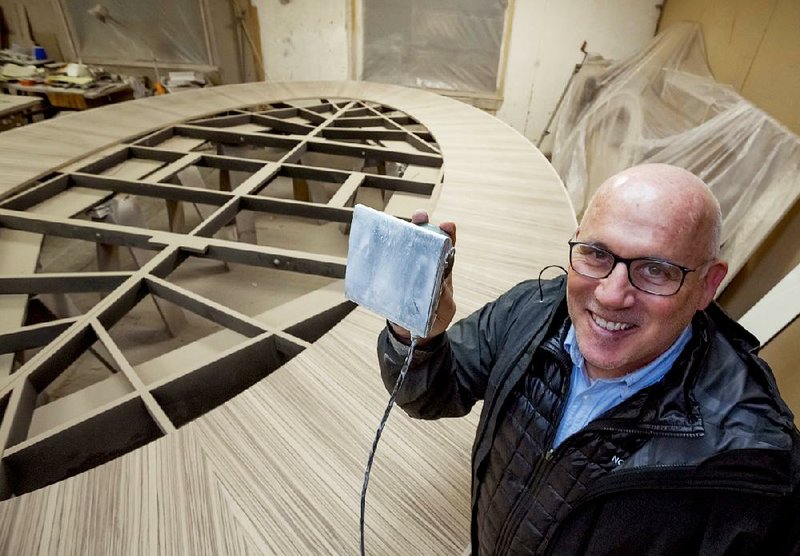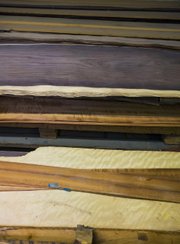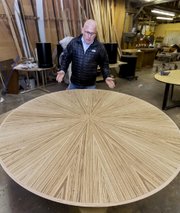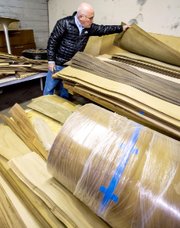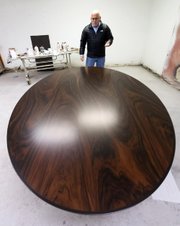There's cypress submerged in a South Carolina river for decades. There's zebrawood that can take on countless looks depending how it's dyed or stained. There are African etimoe, East Indian rosewood, sassafras and the nearly extinct American chestnut.
In Tommy Farrell's North Little Rock workshop, every stack of wood veneer has a story. Every step of the creative process -- the way he flows the veneer and the dyes and finishes he applies -- adds to and enhances the story of each table, cabinet or credenza he makes.
"That's what I want to do," Farrell says. "I want to do the things that people remember. It's a point of pride but also an expression, a way to speak to people."
Arkansas is blessed with a number of active and diverse furniture-makers who take this sentiment to heart as they make unique pieces for homes and businesses in the Natural State and beyond.
An online search for Arkansas-made furniture will turn up a decent-size list of local craftsmen. However, many of them say there isn't much of a community among furniture-makers. The likely reason is that it can be tough for artisans to make their mark and expand their businesses.
"It's not a build-it-and-they-will-come kind of business," Farrell says, explaining that he welcomes new furniture-makers. "I market constantly on Facebook, talk to people. You never stop."
As a newcomer on the state's artisanal furniture scene, Mark Ellis, founder of Freelance Customs in Newport, is driven by motivational entrepreneur Farrah Gray's quote, "Build your own dreams or someone else will hire you to build theirs."
Since 2013, he has been making vintage- and industrial-style custom furniture using solid wood and metal. Now, it's a side project while he works full time, but his dream (and five-year plan) is to open a storefront with a workshop.
Ellis says he learned to build furniture from working at a metal fabrication shop and from his grandfather, who was a diesel mechanic and "always tinkering with stuff."
He started making things for himself and posting pictures on Facebook and Instagram. People began asking him to make custom pieces, including conference tables, nesting tables, nightstands, dining tables and more.
Redefining Rustic
Sometimes artisanship follows a bloodline, but sometimes the path is an unlikely one. The latter is definitely true for James Smith.
In 2011, Smith was between jobs and at a crossroads.
Around this time, Pinterest was gaining popularity, and Smith's background in digital marketing and interest in social media led him to start researching the platform.
"I noticed that a lot of the furniture pinned was very
rustic, with simplistic designs, very clean lines, and solid wood," he says. "I noticed it was hard to find that look in furniture stores, where things are overly polished and manufactured-looking."
Smith bought a $40 Skil saw and some wood, built a coffee table and put it up for sale online. The first one took a while to sell, but he soon got requests to build tables, benches and other furniture.
"I had no carpentry experience, but needed the money," he says. "When someone asked if I could build X, the answer was always 'yes.' I'd get online and Google it and figure out how to do it."
James Eldridge, an acquaintance, joined him and they launched James + James Furniture. Now, the company has 20 full-time employees and two locations in Springdale: a retail showroom and a 12,000-square-foot production facility.
Smith says the company focuses on custom-made furniture, which customers can design themselves on its website. Everything is solid wood or solid wood and metal, and Smith says they work with a local mill and can access just about anything a customer wants.
The style is "refined rustic," Smith says. "We want to say rustic, but we don't want people to think of logs that still have the bark on them. We try to do things that are very simplistic and timeless."
Dining room tables are the most popular item, Smith says, but "if it's a free-standing piece of furniture that can be built out of wood, we build it." This includes tables, benches, beds, chairs, sliding barn doors, bookshelves and more.
Most of James + James' customers are outside Arkansas. Every six weeks, Smith says, the company's delivery crew drives all over the country, including Dallas, New York and Atlanta, delivering custom-made pieces.
"We love going around to all these other areas and bringing the money back to Northwest Arkansas to create jobs," he says. "We have a really strong sense of wanting to grow. We're committed to continuing to grow to create more jobs. That's what it's about for us."
Finishing touches
Farrell grew up in New York and learned woodworking from his mother, who also taught him plumbing and electrical work. The family, which includes seven children, lived in a brownstone. He recalls the price was $7,800. Because his father's job didn't pay much, it fell on the family to maintain the structure.
"They had their house but it required constant upkeep," he says. "Since I was the youngest boy, I was the helper. [My mom] taught me how to use saws, drills, hammers and nails."
His mother was self-taught. Her family had a 200-year-old homestead in the Berkshires in Massachusetts, and there was always work to be done on the property.
As a teenager, Farrell worked after school remodeling brownstones in Brooklyn and used wooden barrels to make planters, chairs and other furnishings to sell. He went to architecture school for a year, but dropped out to enroll at The Evergreen State College in Olympia, Wash., to focus on his true calling -- working with wood.
"I decided I wanted to commit myself to woodworking and making furniture," Farrell says. He started a furniture-making business when he moved back to New York.
He moved to Arkansas after marrying an Arkansas native.
Tommy Farrell Custom Furniture has been operating in a large industrial space off East Broadway in North Little Rock for about 25 years. The company's specialty is "exotic wood veneers," he says.
Farrell bought most of the piles of veneer in his shop from companies that are now out of business. Otherwise, the veneer might have ended up in the trash.
"Even though they are exotic, it's a recycling of sorts," he says. "You just need to know how to find them and know what to ask for."
Google is a big help with that. Farrell constantly researches types of wood and how they potentially can look. He experiments with finishes and dyes to create new and different accents that show off the grain.
The business is built on custom designs; Farrell and his staff apply these techniques to tables, cabinets, paneling and more. He has made conference tables for major corporations and pieces for homeowners in Arkansas, Texas, Tennessee, New York and beyond.
"The client relationship is always very important to me -- and giving them what they want," he says. "Hopefully, we're known for our obsession with quality and getting things ... right."
To help clients visualize a piece in a room, Farrell uses 3-D design to lay it out, or sometimes he'll just use a couple of sawhorses and a scaled piece of cardboard.
"It's coming up with a really good design so people go 'wow,' and it serves the client's needs," he says. "Function is the most important thing, and being beautiful and functional, [that's] a home run."
Looking locally
While Ellis continues following his dream in Newport, he is also dedicated to helping other small businesses grow. He uses a local sawmill to source wood and other local businesses when the need arises.
"I think all small businesses think that way, so I try to help them out and in return they help me," he says.
Farrell also uses local sources for materials, including metals and plywood, and relies on local subcontractors for parts.
"It's all within 100 miles of my shop," he says. "That's a good way to do business. It's the right thing to do to support your community."
Smith agrees. In addition to using a nearby sawmill, he gives priority to Springdale- area vendors when sourcing other materials.
"It's just good business," he explains. "It helps us out locally as a community, but you also save on freight and [fuel] emissions."
It's the truly quintessential American story that appeals to customers, Smith says. The story of a guy building furniture in his garage before expanding into a full-fledged business; the story of a lifelong dedication to building quality pieces; and, the one about following a dream.
"There's also this awesome sense of satisfaction," Smith says. "You get up in the morning, and work and work, and you can literally see a piece of furniture that you've created from a scrap of wood."
Then, there's seeing a photo of that piece in someone's home and hearing about how much he enjoys it.
"You can't beat that feeling," he says. "There's the sense that every night, thousands of people across the country are gathering around a piece of furniture that you made."
HomeStyle on 01/14/2017
